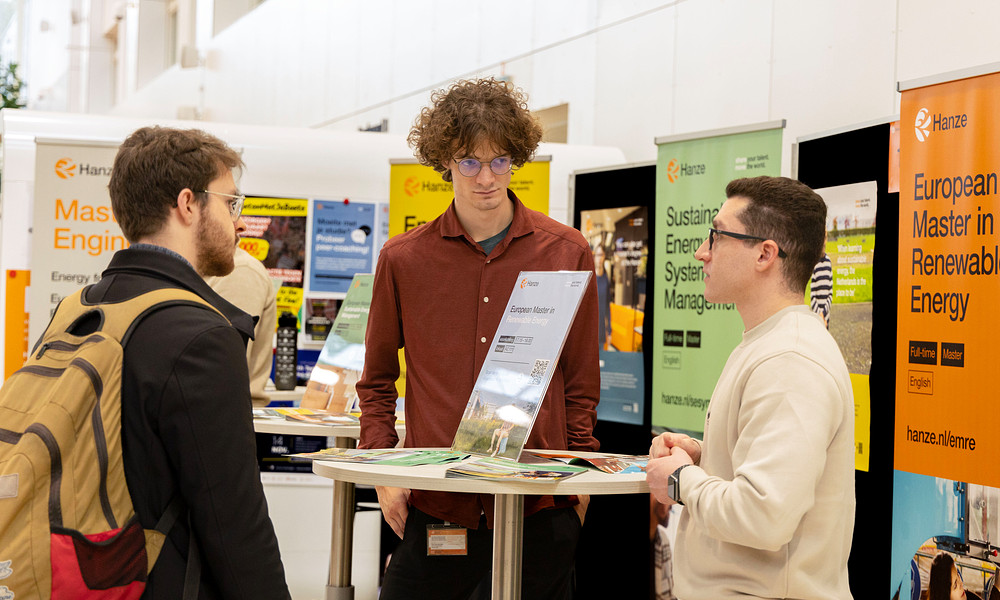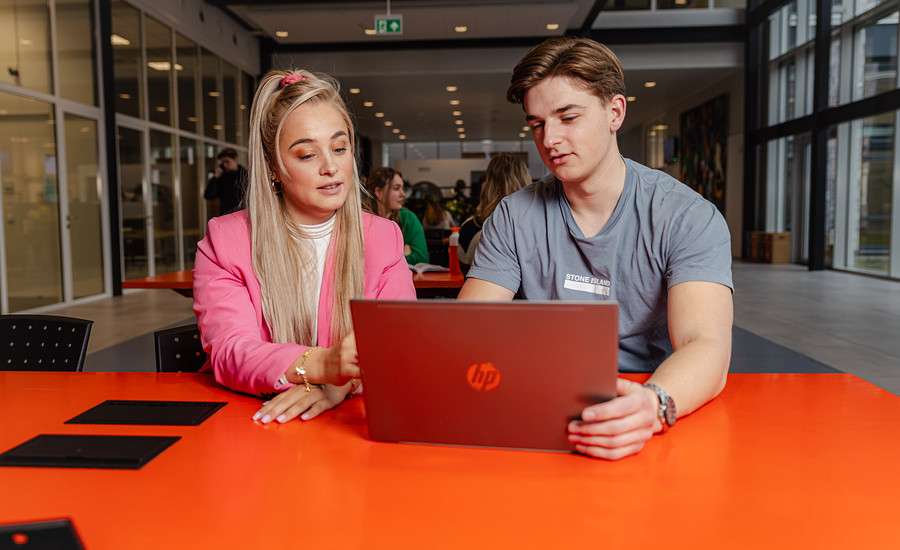'Following a master's degree provides additional professional development'
- News

In November students of the Energy for Society master's programme visited Brussels. Programme manager Henmar Moesker and lecturer Wytze van der Gaast were there and reveal more about the study trip, the Energy for Society master's programme and the importance of the HBO master's programme in general.
Van der Gaast is a professor in Economic aspects of the energy transition. About the realisation of the study trip, he says: "We worked together with the Huis van de Provincies in the Northern Netherlands. They are in contact with various cities in Europe through Cities Mission, a project of the European Union aimed at climate-neutral and smart cities by 2030. Two months ago, the project made a request for proposals from six European cities. Representatives of these cities shared some of the problems faced within the energy transition. Our students then devised interventions for these problems. The problems were, for example, about setting up emission-free city centres and about how to get consumers on board with the energy transition. During the meeting in Brussels, the solutions were discussed with the city representatives."
For one of the assignments, students for the municipality of Groningen made a comparison between Madrid and Groningen. In Madrid, the municipality has come a long way when it comes to setting up an emission-free city centre. In Groningen, they are still in the planning phase. Students have looked at what Groningen can learn from Madrid. "The most important question regarding emission-free city centres is: how do you get the local plumber or painter to switch to electric transport? It requires quite a bit of investment from SMEs and it is not always clear what the policy frameworks are. If you know when it will be introduced, companies will invest in zero-emission vehicles. If the policy is uncertain, you get hesitant behaviour. The students’ solution was to involve SMEs in the plans as early as possible. Then you can get companies on board more easily than if you make the decision without them. In addition, the students indicated that mobility hubs in Madrid work well. It means you take products to depots in the city, and from there the items are transported further into the city in smaller electric vehicles. This way, not all vehicles, and certainly not the larger ones, have to enter the centre," says Van der Gaast.
Field professionals were interested in exchanging ideas with students about problems they are struggling with, says Van der Gaast. "Students indicated that they really enjoy being able to discuss issues at the same level as professionals who are involved in urban planning. ' Apparently, we can already do that', a student said. By sparring with professionals, students also get a better sense of what cities have to deal with. It makes problems clear and specific," says Van der Gaast.
How can you advance the energy transition in society? This question is central to the Energy for Society master's programme. Moesker: "During the master's programme, students work on interdisciplinary assignments from within the field of the energy transition. In the second semester, students will work on larger energy transition projects. Then they are expected to come up with their own interventions based on sound research. We do this within their own fictitious consultancy company. Students work within the company as junior consultants and the lecturers are senior consultants." Lecturers actively participate in the company and lecturers propose projects for which they want interventions. "But students determine the course of the assignments themselves. Students at the helm, is our motto," says Van der Gaast. Moesker adds: "Our students have a wide range of knowledge, they come from many different courses. They already have a lot of knowledge themselves, and we teach them to make use of each other's knowledge and to bring it together into a larger whole."
In September, the Dutch Association of Universities of Applied Sciences (Vereniging Hogescholen) , together with all universities of applied sciences in the Netherlands, launched the campaign 'Follow a master's that works for you at a University of Applied Sciences'. There is a high demand in the labour market for master-trained, practice-oriented professionals to face complex challenges such as the energy transition, our ageing population and developments in AI. Moesker on the importance of the University of Applied Sciences’ master's programmes: "We train students who can solve practical problems in the field. Our approach is very practice-oriented but based on thorough research. That is a bit different from many university master's programmes which focus more on the research side. We immediately let students loose in the field, so they also immediately enter into discussions with stakeholders from the field and take on issues. This applies to all master's programmes we offer at Hanze. When you look at the master's programme Energy for Society, students often end up in a coordinating role in governmental organisations or consultancy firms, for example. Students often become the go-to-people who tie projects together and bring the right experts to the table to take it to the next level."
Van der Gaast adds: "In the energy transition, you have to think through many aspects and try to model them. But at a certain point you have to make the translation and make it work in practice. For example, we are involved in a project on the market organisation for our energy system. The system will be overhauled and will be CO2-free. That also means a different organisation. You have to think that through at university level in models and concepts, but it is up to Hanze to figure out how flexible the consumer is. You just need to take that into account to make solutions work." Moesker points out that you do not have to follow a bridging programme if you want to follow a master's at Hanze and that Energy for Society graduates will receive a MSc title, just like at university. She also stresses that, "following a master's provides additional professional development that students will benefit from later on."

Would you like to know more about the international master's programmes at Hanze? Then visit the Online Open Day on December 13. Our English-language bachelor's and master's programmes will be present there.
Online Open DayHow satisfied are you with the information on this page?